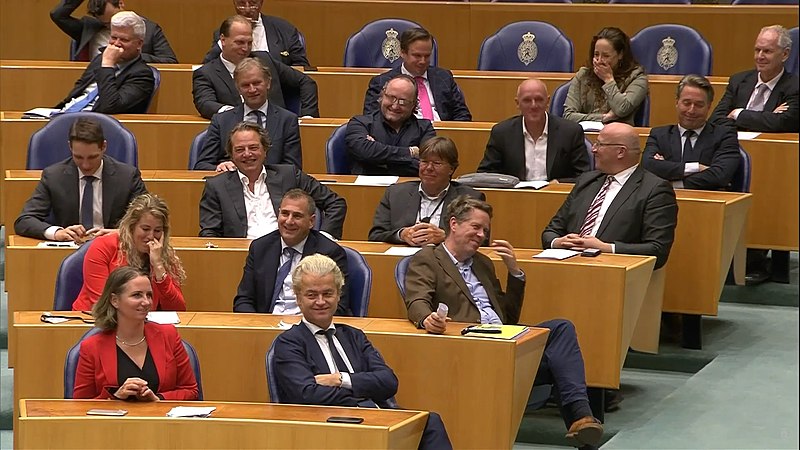It was quite a painful moment, Wednesday evening. At the VVD meeting, Mark Rutte suddenly had a microphone shoved under his nose. A reporter from RTL wanted to know from the resigning prime minister what he thought of the first exit poll. He indicated that Geert Wilders had won no fewer than 35 seats – later this number even became 37 – while his VVD had fallen back to 24. Rutte continued to smile broadly, but made no comment. ‘I’m not saying anything about that at all. If you have any questions about the ceasefire in Gaza …’ But the reporter did not allow him to finish that sentence.
Rutte was allowed to govern the Netherlands for thirteen years and his departure resulted in a monster score from his great political enemy. The story goes that Rutte told Wilders in 2012 that he would ‘destroy his party down to the last seat’. Wilders had just withdrawn his tolerating support, after which Rutte saw his first government fall. Rutte has never forgiven him for that. That is why he has since excluded him from government participation.
The misers of Europe
The fact that Wilders can now simply become his successor must be incredibly sad. Moreover, many analysts partly blame Rutte for the election victory. He dropped his fourth government because he wanted to implement a stricter migration policy. Two of his coalition partners – D66 and the Christian Union – did not want to follow him in this and so Rutte decided to pull the plug on his cabinet, something he had never done before.
Migration therefore became one of the most important themes of the campaign, the theme on which Wilders has been capitalizing for years. Because he had to stay on the sidelines, Wilders could easily criticize government policy. If it were up to him, there would immediately be a complete asylum stop and illegal immigrants would be quickly deported from the country (see opposite). Everyone knows that this will not work in practice – the Italian Prime Minister Giorgia Meloni knows all about it – but that is what his program says and his voters at least want to give him the chance to try.
Rutte not only made the strategic blunder by making migration the focus of the elections, he is also being presented with the bill for 13 years of governance that was entirely built on pragmatism. NRC writes this in a harsh commentary. According to the newspaper, the great success of the PVV, but also of the New Social Contract, should not have surprised anyone. ‘The two’s gains are a direct result of years of erosion of ideological politics. Citizens no longer trust the government and this is partly due to 13 years of political pragmatism without an eye for society.’
Rutte can be blamed even more. Although he had softened his tone a bit in recent years, he never made a big deal about European cooperation. In 2020, Rutte and his Minister of Finance, Wopke Hoekstra, were still called the ‘misers of Europe’ because they continued to obstruct the European multi-year budget. With that rhetoric, Rutte played perfectly into Wilders’ hands. He still wants to leave the EU.
When Rutte’s successor, Dilan Yesilgöz, also said that she no longer wanted to exclude the PVV in advance, she gave potential Wilders voters new hope. A vote for the PVV would not be a waste this time. When she realized in the last days of the campaign that she had made a mistake and suddenly closed the door on ‘Prime Minister Wilders’, it was only extra motivation to vote for Wilders.
Impeccable course
The VVD therefore has reason to conduct self-examination. Whoever did that on Wednesday evening – although it was rather ironic – were the men of Today Inside, the popular talk show on SBS6. “Have we hoisted Wilders on the shield?” Wilfred Genee wondered when the first exit poll was announced. For the first time, John De Mol’s broadcaster had also organized an election debate. Wilders made a good turn. Some felt he had been given too many open goal moves. Genee seemed genuinely affected that Wilders had become so great. Johan Derksen and René van der Gijp, his regular table guests, had fewer problems with it, although they also did not see Wilders as the most suitable prime minister.
Wilders also constantly spoke about his intention to ‘put the Dutch first again’, the perfect message for all voters who were experiencing economic difficulties due to the harsh neoliberal policies of the four Rutte governments. Omtzigt also built its campaign around that message. However, he did so in a more nuanced way, which meant that it was less immediately received by some voters. Wilders’ simple promises worked better.



